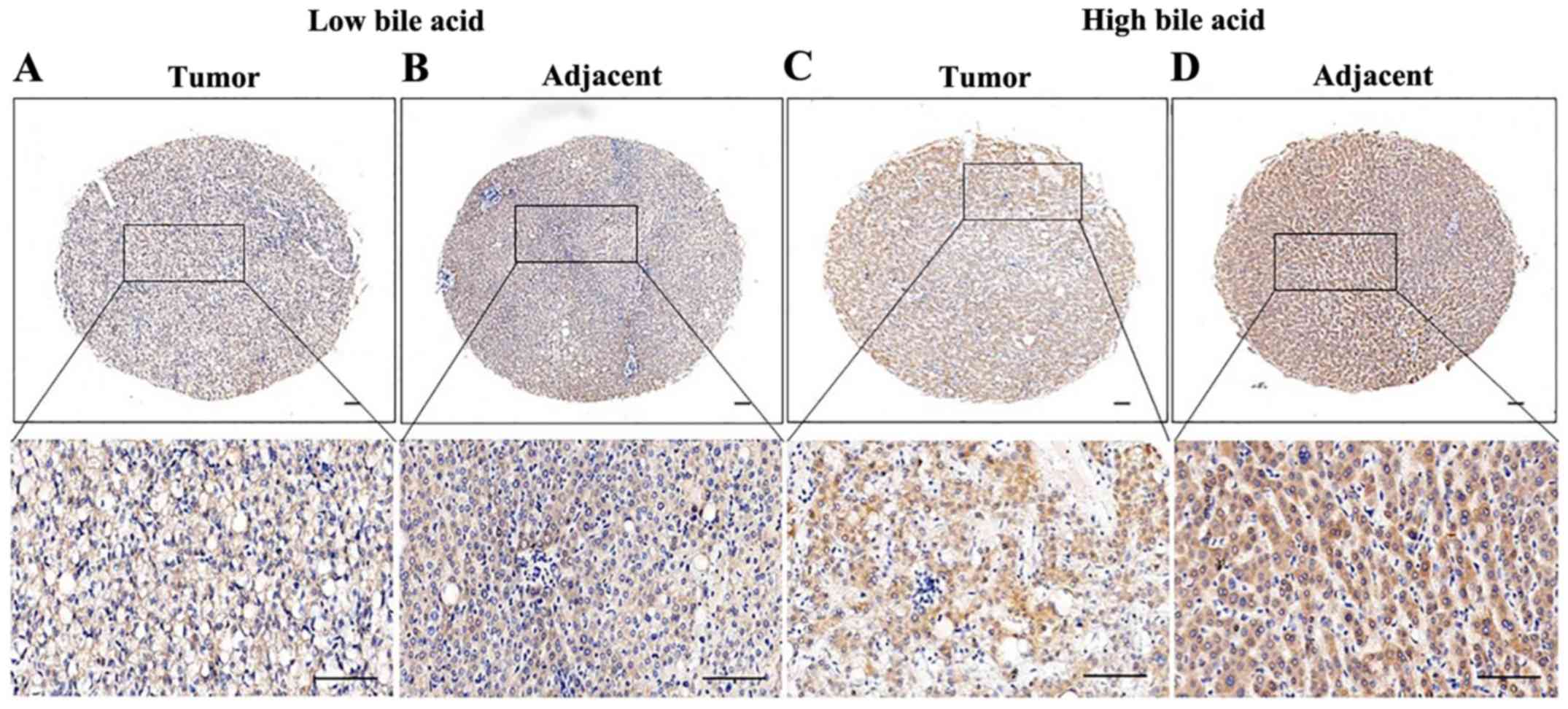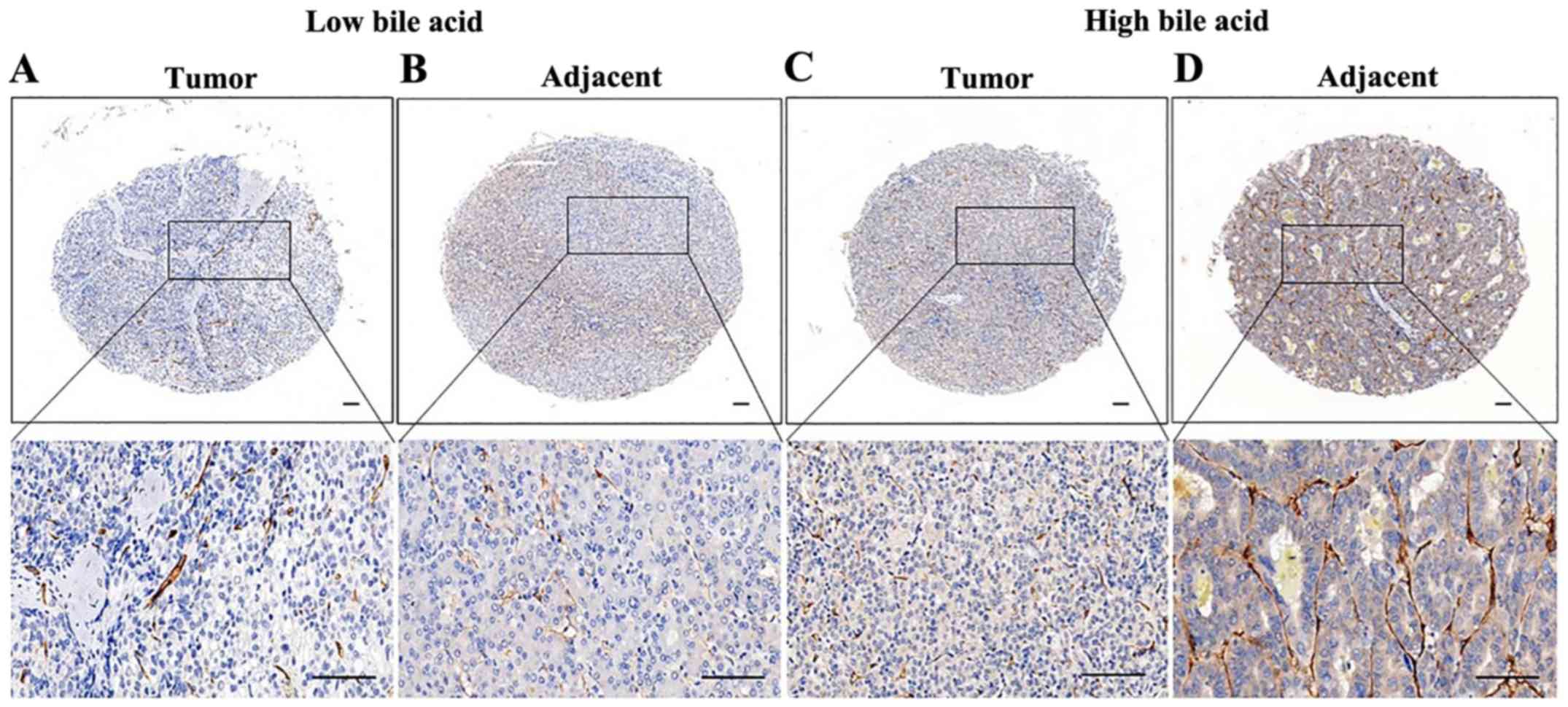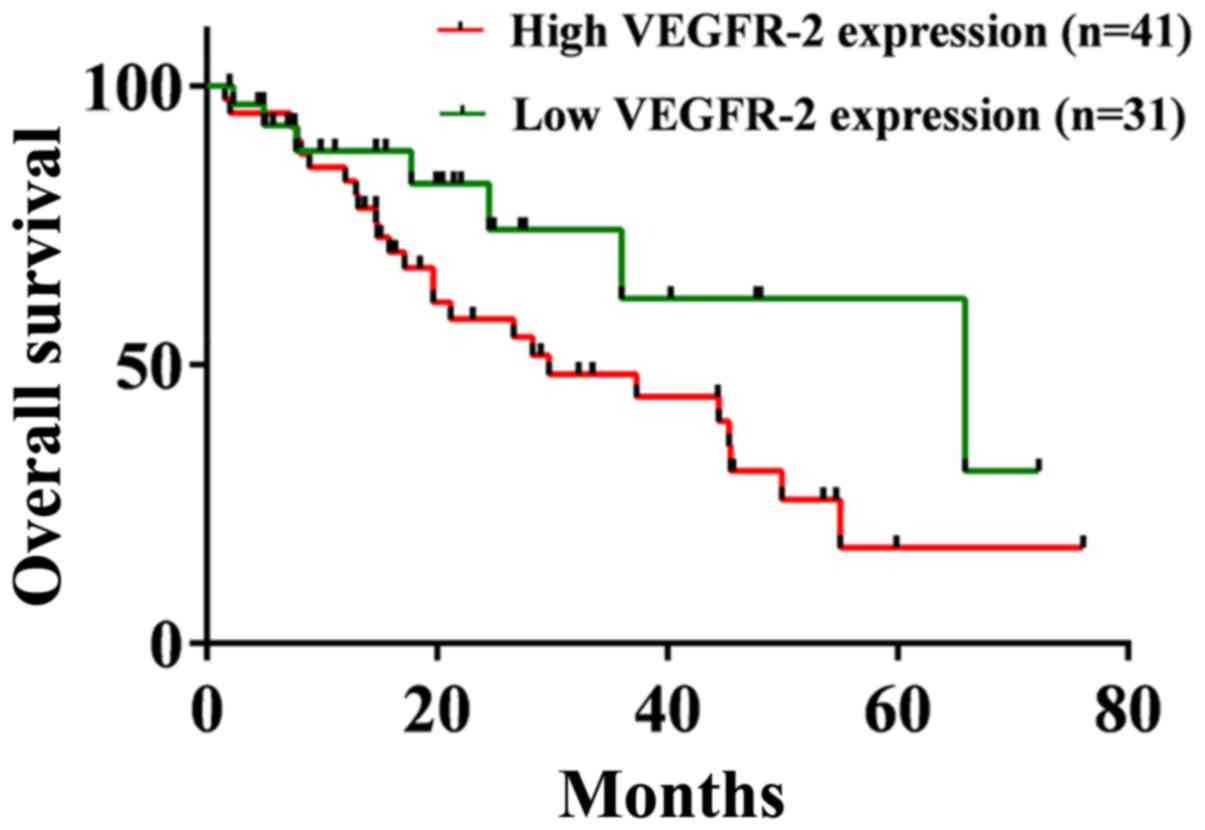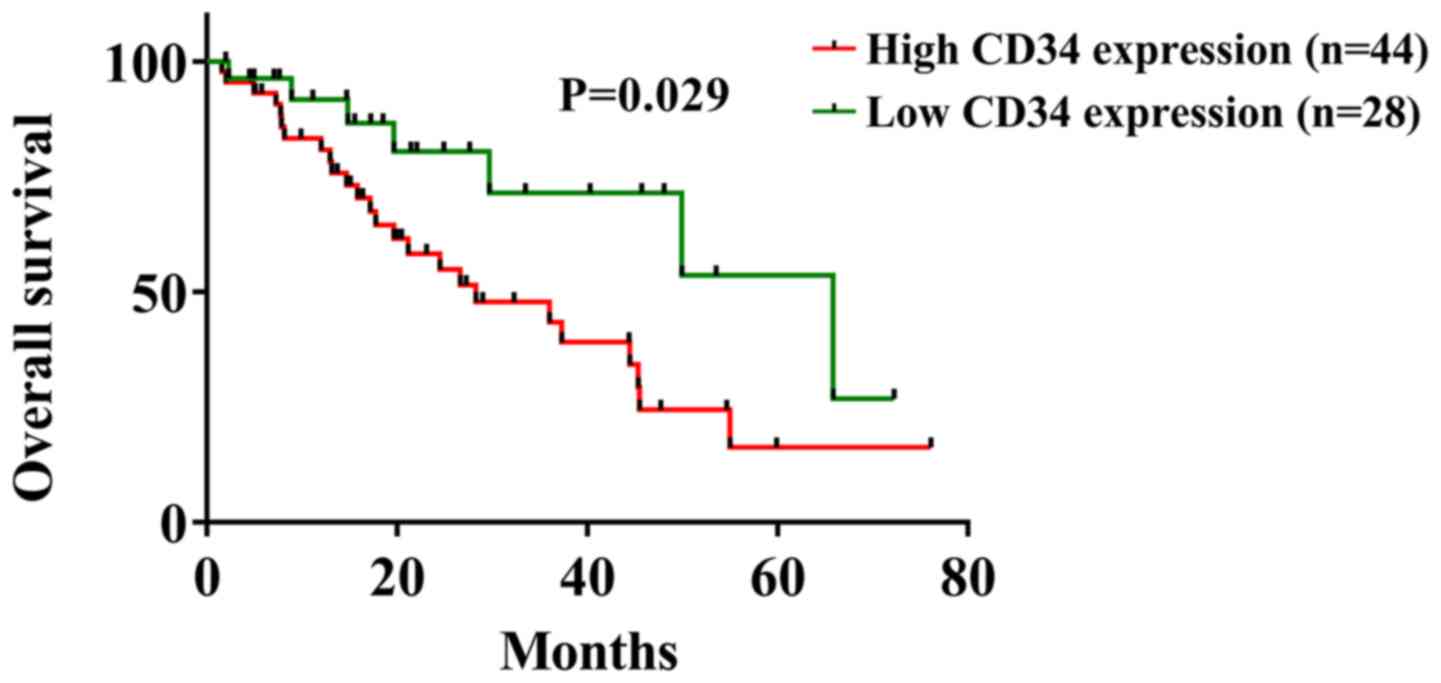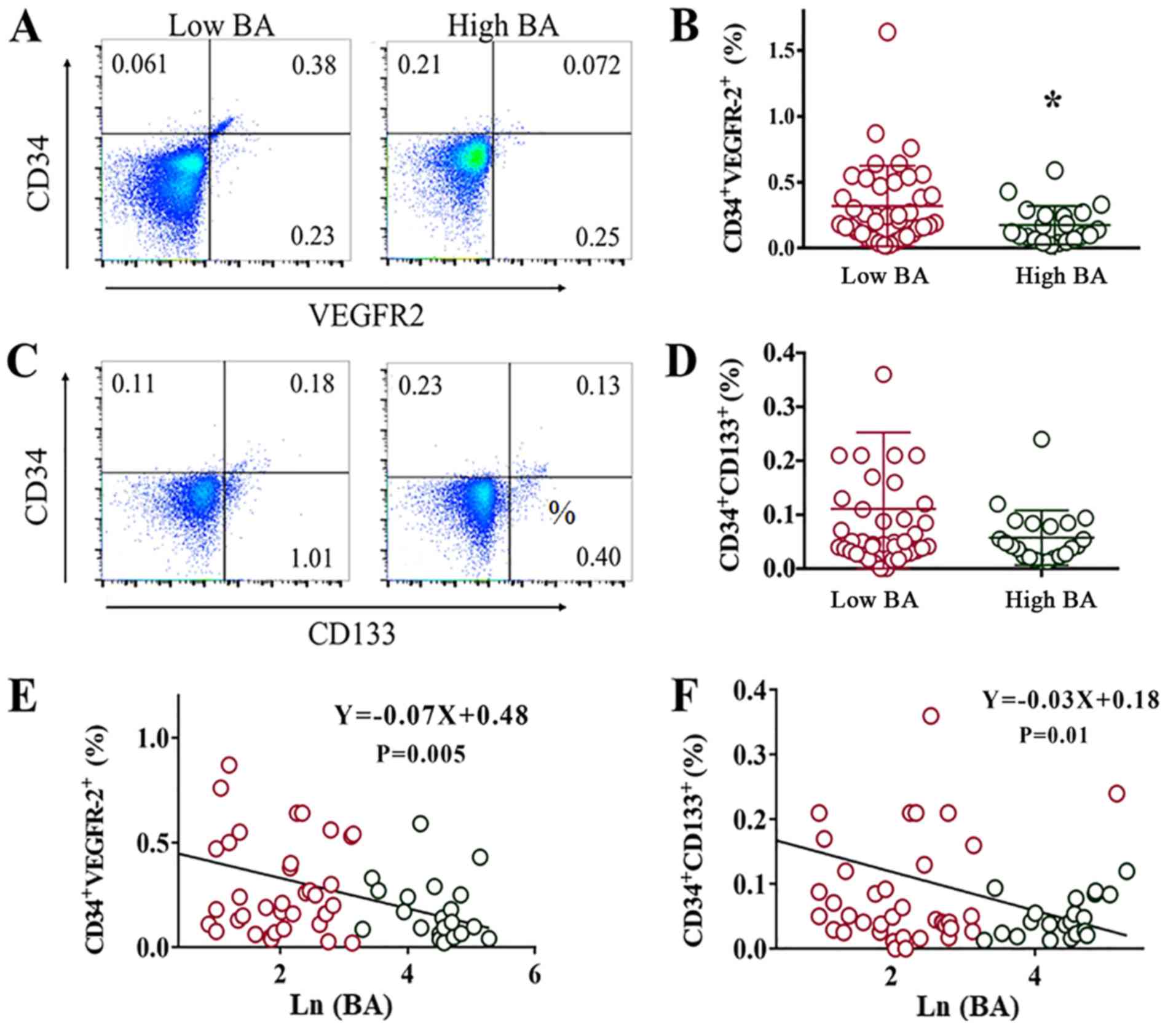|
1
|
St Croix BD, Rak JW and Kerbel RS:
Consequences of angiogenesis for tumor progression, metastasis and
cancer therapy. Anticancer Drugs. 6:3–18. 1995. View Article : Google Scholar : PubMed/NCBI
|
|
2
|
Hervey-Jumper SL, Garton HJL, Lau D,
Altshuler D, Quint DJ, Robertson PL, Muraszko KM and Maher CO:
Differences in vascular endothelial growth factor receptor
expression and correlation with the degree of enhancement in
medulloblastoma. J Neurosurg Pediatr. 14:121–128. 2014. View Article : Google Scholar : PubMed/NCBI
|
|
3
|
Li S, Xu HX, Wu CT, Wang WQ, Jin W, Gao
HL, Li H, Zhang SR, Xu JZ, Qi ZH, et al: Angiogenesis in pancreatic
cancer: Current research status and clinical implications.
Angiogenesis. 22:15–36. 2019. View Article : Google Scholar : PubMed/NCBI
|
|
4
|
Folkman J: What is the evidence that
tumors are angiogenesis dependent. J Natl Cancer Inst. 82:4–6.
1990. View Article : Google Scholar : PubMed/NCBI
|
|
5
|
Viallard C and Larrivee B: Tumor
angiogenesis and vascular normalization: Alternative therapeutic
targets. Angiogenesis. 20:409–426. 2017. View Article : Google Scholar : PubMed/NCBI
|
|
6
|
Peters EB: Endothelial progenitor cells
for the vascularization of engineered tissues. Tissue Eng Part B
Rev. 24:1–24. 2018. View Article : Google Scholar : PubMed/NCBI
|
|
7
|
Mandraffino G and Saitta A: Endothelial
and circulating progenitor cells: Between diseases and therapies.
Curr Med Chem. 25:4476–4477. 2018. View Article : Google Scholar : PubMed/NCBI
|
|
8
|
Zhou M, Wang H, Zeng X, Yin P, Zhu J, Chen
W, Li X, Wang L, Wang L, Liu Y, et al: Mortality, morbidity, and
risk factors in China and its provinces, 1990-2017: A systematic
analysis for the global burden of disease study 2017. Lancet.
394:1145–1158. 2019. View Article : Google Scholar : PubMed/NCBI
|
|
9
|
Zhu AX, Duda DG, Sahani DV and Jain RK:
HCC and angiogenesis: Possible targets and future directions. Nat
Rev Clin Oncol. 8:292–301. 2011. View Article : Google Scholar : PubMed/NCBI
|
|
10
|
Rafii S and Lyden D: Cancer. A few to flip
the angiogenic switch. Science. 319:163–164. 2008. View Article : Google Scholar : PubMed/NCBI
|
|
11
|
Poon RT, Fan ST, Lo CM, Liu CL, Lam CM,
Yuen WK, Yeung C and Wong J: Extended hepatic resection for
hepatocellular carcinoma in patients with cirrhosis: Is it
justified? Ann Surg. 236:602–611. 2002. View Article : Google Scholar : PubMed/NCBI
|
|
12
|
Ho JW, Pang RW, Lau C, Sun CK, Yu WC, Fan
ST and Poon RT: Significance of circulating endothelial progenitor
cells in hepatocellular carcinoma. Hepatology. 44:836–843. 2006.
View Article : Google Scholar : PubMed/NCBI
|
|
13
|
Sieghart W, Fellner S, Reiberger T,
Ulbrich G, Ferlitsch A, Wacheck V and Peck-Radosavljevic M:
Differential role of circulating endothelial progenitor cells in
cirrhotic patients with or without hepatocellular carcinoma. Dig
Liver Dis. 41:902–906. 2009. View Article : Google Scholar : PubMed/NCBI
|
|
14
|
Yu D, Sun X, Qiu Y, Zhou J, Wu Y, Zhuang
L, Chen J and Ding Y: Identification and clinical significance of
mobilized endothelial progenitor cells in tumor vasculogenesis of
hepatocellular carcinoma. Clin Cancer Res. 13:3814–3824. 2007.
View Article : Google Scholar : PubMed/NCBI
|
|
15
|
Shaked Y, Henke E, Roodhart JM, Mancuso P,
Langenberg MH, Colleoni M, Daenen LG, Man S, Xu P, Emmenegger U, et
al: Rapid chemotherapy-induced acute endothelial progenitor cell
mobilization: Implications for antiangiogenic drugs as
chemosensitizing agents. Cancer Cell. 14:263–273. 2008. View Article : Google Scholar : PubMed/NCBI
|
|
16
|
Li CX, Shao Y, Ng KT, Liu XB, Ling CC, Ma
YY, Geng W, Fan ST, Lo CM and Man K: FTY720 suppresses liver tumor
metastasis by reducing the population of circulating endothelial
progenitor cells. PLoS One. 7:e323802012. View Article : Google Scholar : PubMed/NCBI
|
|
17
|
Lee ES, Han EM, Kim YS, Shin BK, Kim CH,
Kim HK, Won NH, Yeom BW, Kim I and Leong ASY: Occurrence of c-kit+
tumor cells in hepatitis B virus-associated hepatocellular
carcinoma. Am J Clin Pathol. 124:31–36. 2005. View Article : Google Scholar : PubMed/NCBI
|
|
18
|
Yamada S, Takashina Y, Watanabe M,
Nagamine R, Saito Y, Kamada N and Saito H: Bile acid metabolism
regulated by the gut microbiota promotes non-alcoholic
steatohepatitis-associated hepatocellular carcinoma in mice.
Oncotarget. 9:9925–9939. 2018. View Article : Google Scholar : PubMed/NCBI
|
|
19
|
Liu N, Feng H, Lv Y, Liu Q, Deng J, Xia Y,
Guo C and Zhou Y: Role of bile acids in the diagnosis and
progression of liver cirrhosis: A prospective observational study.
Exp Ther Med. 18:4058–4066. 2019.PubMed/NCBI
|
|
20
|
Wu WB, Chen YY, Zhu B, Peng XM, Zhang SW
and Zhou ML: Excessive bile acid activated NF-kappa B and promoted
the development of alcoholic steatohepatitis in farnesoid X
receptor deficient mice. Biochimie. 115:86–92. 2015. View Article : Google Scholar : PubMed/NCBI
|
|
21
|
Liao M, Zhao J, Wang T, Duan J, Zhang Y
and Deng X: Role of bile salt in regulating Mcl-1 phosphorylation
and chemoresistance in hepatocellular carcinoma cells. Mol Cancer.
10:442011. View Article : Google Scholar : PubMed/NCBI
|
|
22
|
Wang C, Yang M, Zhao J, Li X, Xiao X,
Zhang Y, Jin X and Liao M: Bile salt (glycochenodeoxycholate acid)
induces cell survival and chemoresistance in hepatocellular
carcinoma. J Cell Physiol. 234:10899–10906. 2019. View Article : Google Scholar : PubMed/NCBI
|
|
23
|
Cho JG, Lee JH, Hong SH, Lee HN, Kim CM,
Kim SY, Yoon KJ, Oh BJ, Kim JH, Jung SY, et al:
Tauroursodeoxycholic acid, a bile acid, promotes blood vessel
repair by recruiting vasculogenic progenitor cells. Stem Cells.
33:792–805. 2015. View Article : Google Scholar : PubMed/NCBI
|
|
24
|
Takahashi T, Kalka C, Masuda H, Chen D,
Silver M, Kearney M, Magner M, Isner JM and Asahara T: Ischemia-
and cytokine-induced mobilization of bone marrow-derived
endothelial progenitor cells for neovascularization. Nat Med.
5:434–438. 1999. View
Article : Google Scholar : PubMed/NCBI
|
|
25
|
Rafii S: Circulating endothelial
precursors: Mystery, reality, and promise. J Clin Invest.
105:17–19. 2000. View
Article : Google Scholar : PubMed/NCBI
|
|
26
|
Carmeliet P and Jain R: Angiogenesis in
cancer and other diseases. Nature. 407:249–257. 2000. View Article : Google Scholar : PubMed/NCBI
|
|
27
|
Dvorak HF: Vascular permeability
factor/vascular endothelial growth factor: A critical cytokine in
tumor angiogenesis and a potential target for diagnosis and
therapy. J Clin Oncol. 20:4368–4380. 2002. View Article : Google Scholar : PubMed/NCBI
|
|
28
|
Ferrara N, Hillan KJ, Gerber HP and
Novotny W: Discovery and development of bevacizumab, an anti-VEGF
antibody for treating cancer. Nat Rev Drug Discov. 3:391–400. 2004.
View Article : Google Scholar : PubMed/NCBI
|
|
29
|
Hamanishi J, Mandai M, Iwasaki M, Okazaki
T, Tanaka Y, Yamaguchi K, Higuchi T, Yagi H, Takakura K, Minato N,
et al: Programmed cell death 1 ligand 1 and tumor-infiltrating CD8+
T lymphocytes are prognostic factors of human ovarian cancer. Proc
Natl Acad Sci USA. 104:3360–3365. 2007. View Article : Google Scholar : PubMed/NCBI
|
|
30
|
Zhao S, Wang M, Yang Z, Tan K, Zheng D, Du
X and Liu L: Comparison between child-pugh score and
albumin-bilirubin grade in the prognosis of patients with HCC after
liver resection using time-dependent ROC. Ann Transl Med.
8:5392020. View Article : Google Scholar : PubMed/NCBI
|
|
31
|
Glaser S, Onori P, Gaudio E, Ueno Y,
Pannarale L, Franchitto A, Francis H, Mancinelli R, Carpino G,
Venter J, et al: Taurocholic acid prevents biliary damage induced
by hepatic artery ligation in cholestatic rats. Dig Liver Dis.
42:709–717. 2010. View Article : Google Scholar : PubMed/NCBI
|
|
32
|
Nakamura K, Zen Y, Sato Y, Kozaka K,
Matsui O, Harada K and Nakanuma Y: Vascular endothelial growth
factor, its receptor Flk-1, and hypoxia inducible factor-1alpha are
involved in malignant transformation in dysplastic nodules of the
liver. Hum Pathol. 38:1532–1546. 2007. View Article : Google Scholar : PubMed/NCBI
|
|
33
|
Iavarone M, Lampertico P, Iannuzzi F,
Manenti E, Donato MF, Arosio E, Bertolini F, Primignani M,
Sangiovanni A and Colombo M: Increased expression of vascular
endothelial growth factor in small hepatocellular carcinoma. J
Viral Hepat. 14:133–139. 2007. View Article : Google Scholar : PubMed/NCBI
|
|
34
|
Jia JB, Zhuang PY, Sun HC, Zhang JB, Zhang
W, Zhu XD, Xiong YQ, Xu HX and Tang ZY: Protein expression
profiling of vascular endothelial growth factor and its receptors
identifies subclasses of hepatocellular carcinoma and predicts
survival. J Cancer Res Clin Oncol. 135:847–854. 2009. View Article : Google Scholar : PubMed/NCBI
|
|
35
|
Huang J, Zhang X, Tang Q, Zhang F, Li Y,
Feng Z and Zhu J: Prognostic significance and potential therapeutic
target of VEGFR2 in hepatocellular carcinoma. J Clin Pathol.
64:343–348. 2011. View Article : Google Scholar : PubMed/NCBI
|
|
36
|
Llovet JM, Ricci S, Mazzaferro V, Hilgard
P, Gane E, Blanc JF, de Oliveira AC, Santoro A, Raoul JL, Forner A,
et al: Sorafenib in advanced hepatocellular carcinoma. N Engl J
Med. 359:378–390. 2008. View Article : Google Scholar : PubMed/NCBI
|
|
37
|
Wang H, Chen K, Niu G and Chen X:
Site-specifically biotinylated VEGF(121) for nearinfrared
fluorescence imaging of tumor angiogenesis. Mol Pharm. 6:285–294.
2009. View Article : Google Scholar : PubMed/NCBI
|
|
38
|
Giannelli G, Sgarra C, Porcelli L,
Azzariti A, Antonaci S and Paradiso A: EGFR and VEGFR as potential
target for biological therapies in HCC cells. Cancer Lett.
262:257–264. 2008. View Article : Google Scholar : PubMed/NCBI
|
|
39
|
Tsuji N, Ishiguro S, Sasaki Y and Kudo M:
CD34 expression in noncancerous liver tissue predicts multicentric
recurrence of hepatocellular carcinoma. Dig Dis. 31:467–471. 2013.
View Article : Google Scholar : PubMed/NCBI
|
|
40
|
Yang ZF and Poon RT: Vascular changes in
hepatocellular carcinoma. Anat Rec (Hoboken). 291:721–734. 2008.
View Article : Google Scholar : PubMed/NCBI
|
|
41
|
Segatelli V, de Oliveira EC, Boin IF,
Ataide EC and Escanhoela CA: Evaluation and comparison of
microvessel density using the markers CD34 and CD105 in
regenerative nodules, dysplastic nodules and hepatocellular
carcinoma. Hepatol Int. 8:260–265. 2014.PubMed/NCBI
|
|
42
|
Zhu X, Zhou H, Luo J, Cui Y, Li H, Zhang
W, Fang F, Li Q and Zhang T: Different but synergistic effects of
bone marrow-derived VEGFR2+ and VEGFR2−CD45+ cells during
hepatocellular carcinoma progression. Oncol Lett. 13:63–68. 2017.
View Article : Google Scholar : PubMed/NCBI
|
|
43
|
Fürstenberger G, von Moos R, Lucas R,
Thürlimann B, Senn HJ, Hamacher J and Boneberg EM: Circulating
endothelial cells and angiogenic serum factors during neoadjuvant
chemotherapy of primary breast cancer. Br J Cancer. 94:524–531.
2006. View Article : Google Scholar : PubMed/NCBI
|
|
44
|
Zahran AM, Abdel-Rahim MH, Refaat A, Sayed
M, Othman MM, Khalak LMR and Hetta HF: Circulating hematopoietic
stem cells, endothelial progenitor cells and cancer stem cells in
hepatocellular carcinoma patients: Contribution to diagnosis and
prognosis. Acta Oncol. 59:33–39. 2020. View Article : Google Scholar : PubMed/NCBI
|















